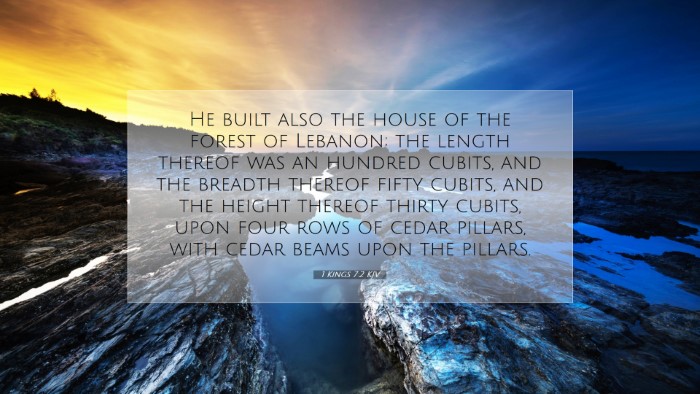Commentary on 1 Kings 7:2
Verse: 1 Kings 7:2 - "He built also the house of the forest of Lebanon; the length thereof was an hundred cubits, and the breadth thereof fifty cubits, and the height thereof thirty cubits, upon four rows of cedar pillars, with cedar beams upon the pillars."
Introduction
This verse describes a significant architectural achievement by King Solomon: the construction of the "house of the forest of Lebanon." This structure, along with the intricate details involved in its design, gives us insights into the wealth, power, and sophistication of Solomon's reign. Public domain commentaries offer rich interpretations that highlight not only the physical characteristics of the building but also its symbolic meanings.
Architectural Significance
According to Matthew Henry, the "house of the forest of Lebanon" signifies Solomon's intentions to create a space that reflects both beauty and strength. The selection of cedar, especially from Lebanon, suggests not just a preference for aesthetics but also a sign of durability.
Henry notes that the house’s massive dimensions: one hundred cubits in length, fifty in breadth, and thirty in height, emphasize Solomon’s culture of grandeur. Each cubit in this context, highlighting the vastness, conveys not merely functional use but also serves as a testimony to Solomon’s wealth and the artistry of Israel's craftsmen.
Cultural and Political Context
Albert Barnes provides context to this construction as reflective of Solomon's diplomatic ties and military prowess. The timber from Lebanon was highly valued, renowned for its quality and scent, and symbolically represents Solomon's reach beyond Israel. This building was not merely a retreat; it was also a signal to foreign nations of Israel’s dominance and resources.
Furthermore, the construction served practical purposes. Barnes argues that such a structure might have been utilized for gatherings, celebrations, or even storing treasures, stressing the multi-functional aspect of this monumental place.
Symbolism of Cedar and Lebanon
Adam Clarke expounds on the reliance on Lebanese cedar, remarking on its significance in Hebrew thought. Cedar is often a symbol of strength and prestige within biblical literature. The choice of materials thus embodies the desired characteristics of the nation under Solomon: strength, durability, and a connection to divine favor.
Clarke further mentions that the surrounding of the building with “cedar pillars” not only adds to its aesthetic value but also biblically represents the steadfastness of God’s promises. As pillars uphold the structure, they can be likened to the faith that upholds believers amidst trials.
Theological Implications
The construction of the house also serves profound theological implications. Both Henry and Barnes suggest that such a majestic project reflects the character of God as the ultimate builder. Just as Solomon constructed this physical structure, God is seen as the architect of creation, crafting a world that bears His glory.
Henry particularly underlines the notion that believers today may see parallels in their spiritual lives, where God is restoring and building them according to His purposes. The grandeur of Solomon’s house may act as a reminder of the ultimate rest that God provides for His people.
User Reflection
The magnificence of the "house of the forest of Lebanon" can invoke a sense of awe and wonder within believers, inviting them to consider God's majesty. Pastors and scholars can thus reflect on ways such architectural metaphors translate into spiritual truths about the Church being the Body of Christ, solid and enduring.
In the context of pastoral teaching, this imagery can serve as a powerful tool in conveying God’s commitment to establishing and sustaining His people in faith and fellowship.
Conclusion
In summary, 1 Kings 7:2 is not just a historical account of Solomon's architectural endeavors; it encapsulates theological reflections on strength, faith, and divine craftsmanship. By integrating insights from Matthew Henry, Albert Barnes, and Adam Clarke, we gain a multifaceted understanding of this verse that resonates deeply with pastors, students, and all seekers of truth.


